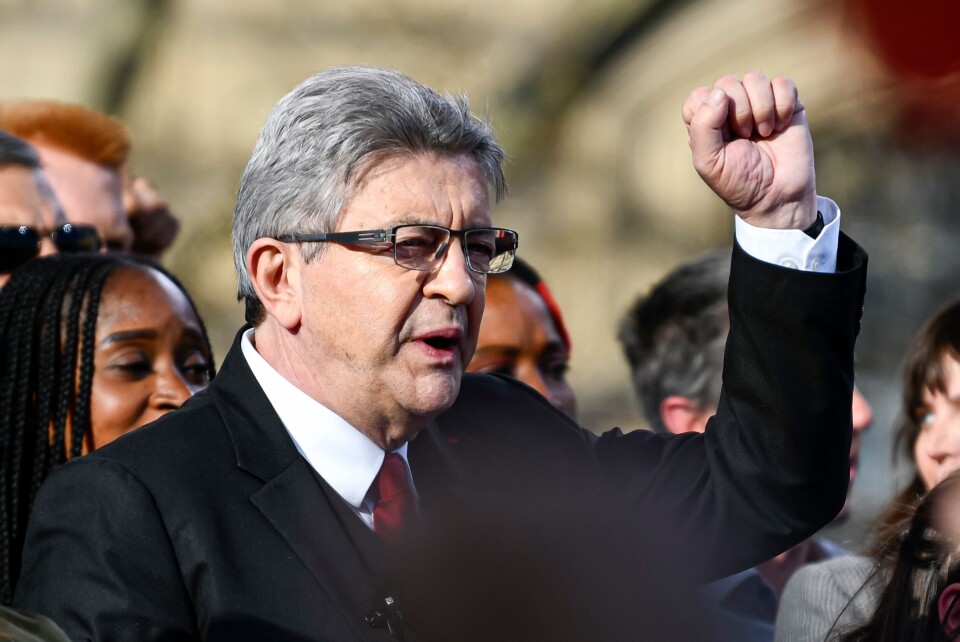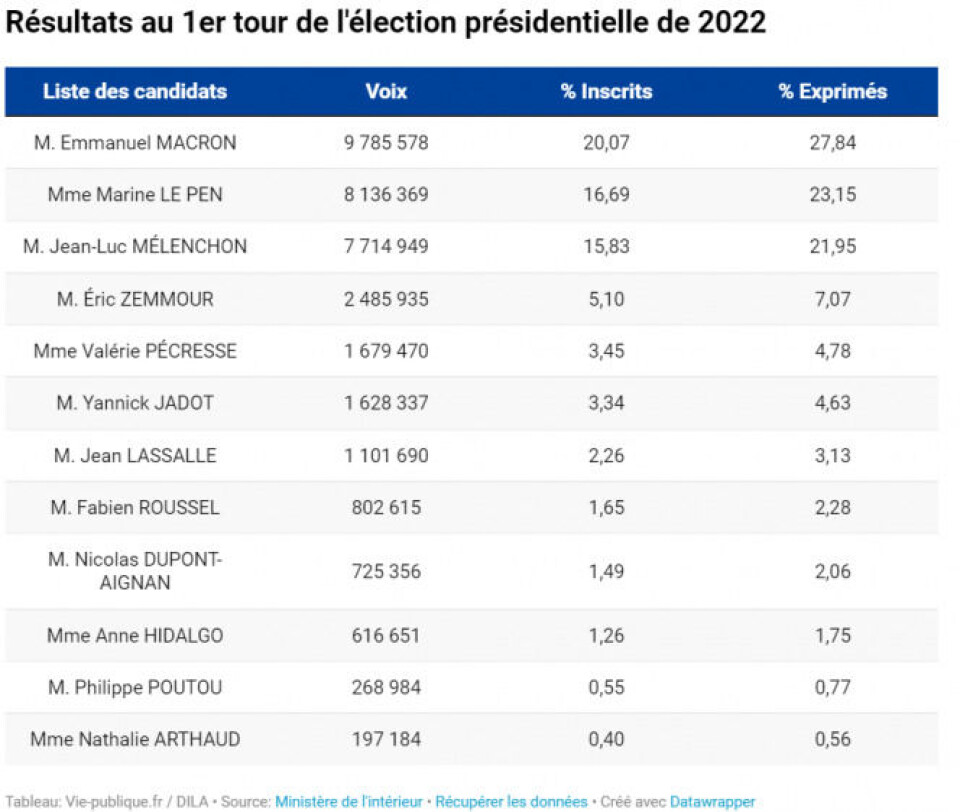-
Warnings after dog poisonings in south of France countryside
More than 20 dogs, including truffle hunting animals, have been poisoned by mysterious pellets
-
Poll: People in France very attached to local public services
Almost four in 10 would support paying more tax to ensure services remain well-funded
-
US ambassador in France snubs official summons over controversial social media post
It is the second time Charles Kushner has failed to attend a summons from the French Foreign Ministry
How can Mélenchon become French prime minister and how would it work?
The hard-left politician has set his sights on becoming head of government to contest President Macron's policies

Jean-Luc Mélenchon of the hard-left party La France Insoumise has turned his attention to becoming France’s next prime minister after finishing third in this year’s presidential election.
Mr Mélenchon wants to create a united front of left-wing parties to gain power in France’s parliament and bring forward their own policies on social issues and the environment, in contest to the policies of the newly re-elected President Emmanuel Macron.
La France Insoumise agreed over the course of Sunday night (May 1) a new deal with the French green party Europe Ecologie-Les Verts (EELV). The coalition is known as the Nouvelle Union populaire écologique et sociale.
Talks are expected to continue this week with France’s traditional left-wing party Parti socialiste - which only won 1.75% of votes in the first round of the presidential election - and the Parti Communiste Français to try to bring them into the coalition.
Mr Mélenchon’s goal to become the new head of government is not as straightforward as his campaign posters may make it seem. In France, the prime minister is chosen by the president, not elected by the people.
We look at why Mr Mélenchon is campaigning to become prime minister and how it would work if he was chosen.
Why is Mélenchon campaigning to be the new PM?
The country’s current prime minister, Jean Castex, has already stated that he intends to step down ahead of the legislative elections, which will be held on June 12 and 19.
It means that President Macron will have to appoint a new government ahead of that date, including a new prime minister, at least temporarily.
Read more: Lost glasses, Mr Lockdown: Memorable moments of French PM Jean Castex
And in the lead up to these elections, which are sometimes dubbed the “third round” of the presidential elections, Mr Mélenchon has made very clear his desire to take over as prime minister.
Au moins les choses sont claires avec cette affiche : @JLMelenchon à un projet pour lui-même. Pas pour le pays. pic.twitter.com/h0gg8tNi9B
— Pieyre-Alexandre Anglade (@PA_Anglade) April 26, 2022
This may seem odd as it is not the public, but the president, who chooses who is prime minister. But Mr Mélenchon has clarified his plan.
The legislative elections will see 577 MPs elected to France’s lower house of parliament, the Assemblée nationale.
If MPs representing Mr Mélenchon’s party and those of the other parties that he forms a coalition with win a majority of seats, it will create a majority for parties who stand in opposition to Mr Macron and his party, La République en marche.
This is what is known in French politics as a cohabitation, a situation in which the majority in parliament opposes the head of state.
In these cases, the president usually chooses a prime minister who represents the majority, which could end up meaning that Mr Macron chooses Mr Mélenchon to head up his government, although it is not guaranteed.
“I did not ask Mr Macron to appoint me as prime minister. I asked the French to vote for the Union Populaire MPs to put the President under a moral and political obligation to choose the prime minister who will ensure the majority's programme,” Mr Mélenchon said.
S'il y a une majorité de députés de l'#UnionPopulaire, il y aura un 1er ministre de l'#UnionPopulaire. Les pouvoirs du 1er ministre sont considérable. Je les rappelle.
— Jean-Luc Mélenchon (@JLMelenchon) April 21, 2022
#UnionPopulaire #Melenchon1erMinistrehttps://t.co/pyTklV18Tw pic.twitter.com/zNebTxrp4K
Mr Mélenchon is not necessarily overplaying his popularity in believing that a political union headed up by him could win a majority of seats in parliament.
He got 7,714,949 votes in the first round of the presidential elections, around 420,000 fewer than Marine Le Pen, who finished second.
Yannick Jadot of the French greens got 1,628,337, Fabien Roussel of the Parti Communiste Français got 802,615 and Anne Hidalgo of the Parti socialiste got 616,651.
All of these votes combined make 10,762,552, more than the 9,785,578 that Mr Macron won in the first round.
Whether this popularity carries over from the presidential elections to the legislative elections is, though, another question. There tends to be less voter mobilisation, which could affect Mr Mélenchon’s plans.
Read more: Far-Left Mélenchon ‘is dreaming’ in aim to be French prime minister

Results of first round of France’s presidential election 2022.Credit: Vie-Publique
How would it work if Mélenchon was chosen as prime minister?
Usually, a candidate who stands in opposition to a newly elected president is not chosen as the prime minister, as the president’s party tends to win enough support in the legislative elections.
In fact, when Charles de Gaulle conceived the Fifth Republic, he did not imagine a situation of cohabitation ever really occurring. He assumed that if a president was so unpopular as to not win support in the legislatures, he would step down, as Mr de Gaulle did in 1969.
But, there have in the past been three examples of a cohabitation.
The most recent was in 1997 when Lionel Jospin became Jacques Chirac’s prime minister. Before that, in 1993, Édouard Balladur was the head of government under François Mitterrand’s presidency, and before that Mr Chirac himself was an opposition prime minister under Mr Mitterrand, in 1986.
In all instances there were varying degrees of confrontation on certain issues, perhaps most notably between Mr Chirac and Mr Mitterand. But compromises were made to allow the government to continue to function.
If Mr Mélenchon is chosen to be Mr Macron’s head of government, there will no doubt be ideological clashes.
However, Mr Macron has also shown himself willing to respond to calls from the political left to adapt his policies.
He has previously said that he is willing to postpone raising France’s retirement age from 62 to 65, a policy that is deeply unpopular with the Left.
Read more: France’s retirement age debate: What is the healthy life years metric?
He has also recently begun to speak of a planification écologique, intended to make environmental policies a more key component in decision making.
The phrase has long been used by Mr Mélenchon, and is seen as strongly appealing to left-wing voters.
Whether this means that cohabitation between Mr Macron and Mr Mélenchon may be more manageable than expected remains to be seen.
It also remains to be seen whether Mr Mélenchon’s coalition of left-leaning parties will be able to win a majority of seats in parliament, at least enough to convince Mr Macron to choose Mr Mélenchon as the next prime minister.
Related articles
President Macron may form new unifying party to win French MP majority
























